Diversity Through the Eyes of the 2024 Unsung Diversity Hero Award Winners
The College of Agriculture honored five Unsung Diversity Heroes on Jan. 19 as a part of the 13th Annual Dr. Martin Luther King Jr. Celebration Week. The Unsung Diversity Hero Award recognizes staff, faculty and students who have worked to make the College of Agriculture a safe and welcoming environment for all.
Potential award candidates are identified through a standardized nomination process. A committee of three voting members and a non-voting official from the Diversity Action Team in Agriculture (DATA) chooses the winners. This year, Gerald Shively, associate dean and director of international programs in agriculture, presented the awards at a panel discussion about diversity, equity and belonging in the workplace.
The following are this year’s award recipients.
Faculty Award– Mark Russell
Mark Russell, a professor in the Department of Agricultural Sciences Education and Communication (ASEC), has taught others at Purdue about engagement and intercultural leadership and led by example since 1982.
Russell focuses on how diversity “is an asset or a barrier to collaboration, cooperation and communication,” something he first thought about in college. 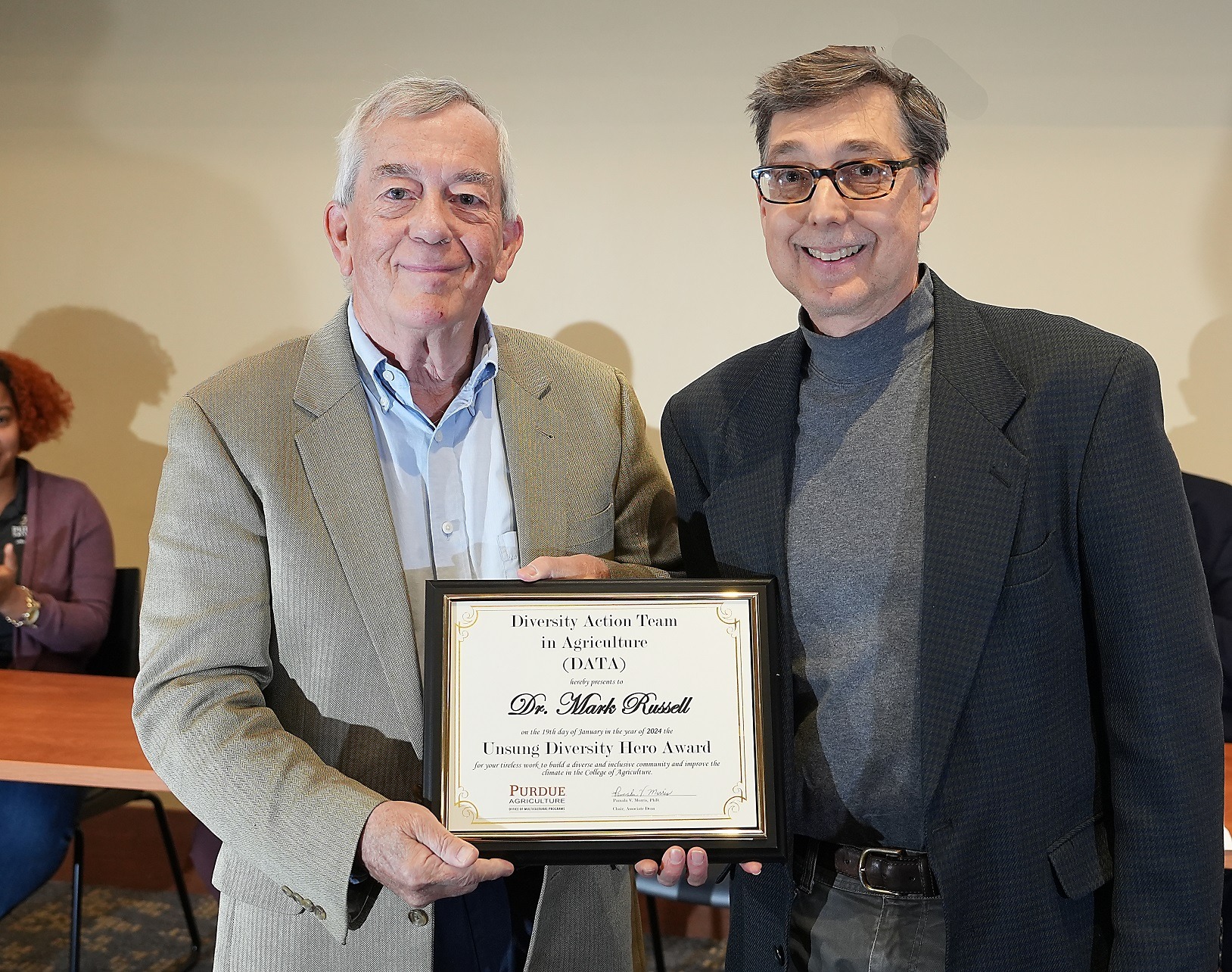
“I grew up with everyone in my school and my neighborhood being exactly like me,” said Russell. “I thought I was ‘normal’ until I went to college and realized, ‘I'm the minority here.’ I had to figure it out. That's where my involvement with diversity began.”
Russell creates a safe and inclusive place for students of all backgrounds to “study who they are, their social identity,” a starting point for discussing diversity. “I talk about my social identity in my classes, but I ask which of my social identities I chose. I try to help people realize, by using my own example, that none of that privilege helps me work together with other people.”
Russell seeks to make not only his classroom a safe space for discussing diversity but all workplaces. For example, he worked with the dean’s office to develop rubrics for assessing Inclusive Excellence, and he developed resources for staff and faculty to advance new models of developing intercultural skills “for integrating diversity, equity and inclusive excellence into the living culture of the College.”
Russell experienced the importance of cultural competency when, during a year sabbatical abroad in Australia, he had a meeting with his department head about teatime. Russell, a chronic coffee drinker who was used to American work culture, thought teatime was “a waste of 60 minutes,” but to his co-workers, it was “a social priority” that was part of community engagement.
“People started treating me differently when I went to teatime,” Russell said. “The department head was right.” From that point on, Russell focused more on teaching others how to become culturally competent.
Although Russell cannot prepare students for every situation they will face, he wants them to come away from his classes understanding that “there are other equally valid ways of thinking and being.” Russell said, “If you’re going to work in groups effectively, you have to be able to accept other people as equally valid.”
Staff Award– Amanda Dickson
Amanda Dickson, international extension specialist for the College of Agriculture, sees diversity as “the differences of lived experiences, perspectives and views,” a definition shaped by her domestic and international experiences.
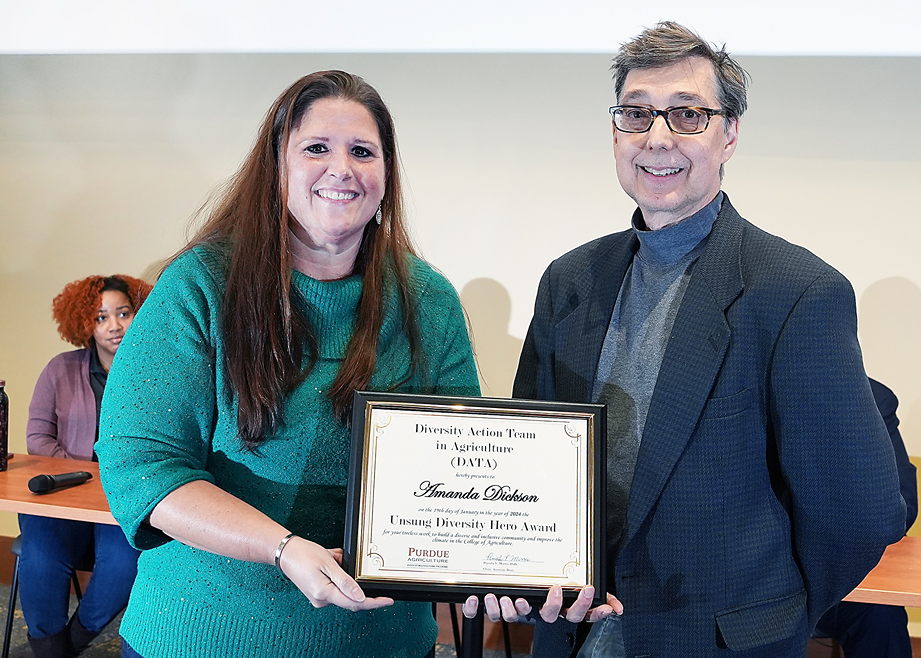
Dickson grew up in Oklahoma, lived in Paraguay as a Peace Corp Volunteer, and worked in South Korea as an English instructor before joining Purdue Extension in 2010. Dickson served in various county-level roles before taking her current, internationally focused position.
Dickson, as an international extension specialist, connects Purdue Extension with the rest of the world and brings international experiences to Extension faculty and staff in the process.
Dickson also builds community through serving on the Diversity Action Team in Agriculture (DATA); on the Purdue Extension's Diversity, Equity and Inclusion (DEI) Strategic Plan committee; in an advisory role to the men’s Gemini co-op and in a DEI representation role on search committees.
Dickson’s impact also reaches across Indiana through the workshops and programs she facilitates. These programs include the Cultural Awareness, Intercultural Conflict Management and Navigating Difference workshops, which aim to bring people together to understand, navigate and embrace their differences.
Leading workshops has allowed Dickson to discover how diversity in Indiana compares with Oklahoma and the other places she has lived. “We’re similar and different in so many ways – our values, beliefs, customs and so on,” Dickson notes. “Living in and experiencing all these communities and all their different activities adds information for me, adds to my perspective.”
Dickson’s work also allows her to share her own diverse experiences with others. “Diversity can be visible, but it also can be hidden as well,” Dickson adds. “One of my hidden diversities is that I belong to the Cherokee Nation. It’s probably not apparent when you first talk to or look at me or even after a long time knowing me, but it’s something that I like to talk about, particularly my observations about the way our government leaders [Chief and President] approach and handle conflict when I am facilitating workshops.”
Although much of Dickson’s work does not relate to diversity, she views the topic as a natural extension of herself. “I think sometimes diversity is intentional, and sometimes it's a byproduct,” Dickson explained. “Most of the [diversity] work that I do is a byproduct. There was never intentionality on my part, but when some of my colleagues noticed that I brought a different perspective, it helped me to get more involved in discussions about diversity.”
Student Award (Three-Way Tie) – Favour Ojike, Busayo Oluyemi and Rachel Zhang
Favour Ojike
“Diversity is those little things that make people different,” said Favour Ojike, a master’s student in agricultural sciences education and communication (ASEC) with a passion for serving others.
Ojike had a narrower definition of diversity before coming to the United States from Nigeria. “Before, I would always think about diversity as one’s race, ethnicity, language or something like that,” Ojike said. “But coming into a country where I have met lots of people from different parts of the world and situated myself to learning about diversity...what I thought to be diversity before is not that anymore. Diversity can include one’s educational level, life experiences, interests, perspectives and more.” 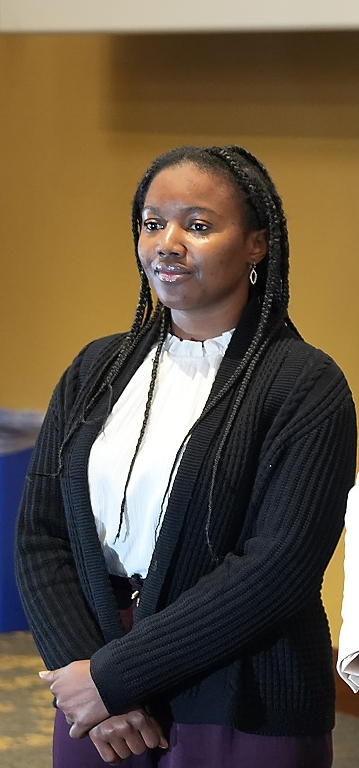
Ojike grows her own understanding of diversity and others’ understandings through her campus involvements. For example, Ojike is president of the Agricultural Sciences Education and Communication Graduate Students Organization (ASEC GSO). As president, Ojike has arranged many events, such as trips to international agricultural shows, that encourage cross-cultural learning.
The student leader also volunteers her time in other ways, including serving as a co-graduate agricultural council representative for the Purdue MANRRS; peer mentoring young African leaders during the 2023 Mandela Washington Fellowship; and organizing a STEM Day camp for middle school students.
“Being a volunteer is beautiful for me because naturally I have this passion for service,” said Ojike. “Sometimes people ask me, ‘How do you have time for all these things’ I don't know. I'm happy when I do these things and when I see people are getting the help they need. I delight in making people smile and helping to achieve goals.”
Ojike plans to continue serving others and learning more about others’ experiences through volunteering and asking questions. “Being in service and being actively involved in all of these efforts has helped me,” Ojike said. “I might not have grown in understanding diversity if I didn't place myself in a position to actively engage with people different from me. When you're engaging with other people with an open mind, you encounter experiences that will prompt you to ask questions and appreciate what makes them different. Diversity is so beautiful; it makes things work.”
Busayo Oluyemi
“Diversity is not just a statistic but a celebration of unique stories, individuals and perspectives,” said Busayo Oluyemi, a second-year Ph.D. student in the Department of Food Science with her own unique story.
Oluyemi grew up in Ogun State, Nigeria, which she calls “a very diverse country” with a complex history of colonialization and civil war. Due to past turmoil, the country has social divisions between different states and tribes that have led to discrimination, which Oluyemi has experienced.
“Seeing people being discriminated against and knowing the same thing can be done to me...it was really disturbing for me as a child,” Oluyemi explained. As she grew up, Oluyemi faced the discrimination she feared. “When I went to the university, I schooled in the same region that is my tribe is in, but because the university wasn’t in my state of origin, when I wanted to get a job, I was highly discriminated against, because I am not from that state.”
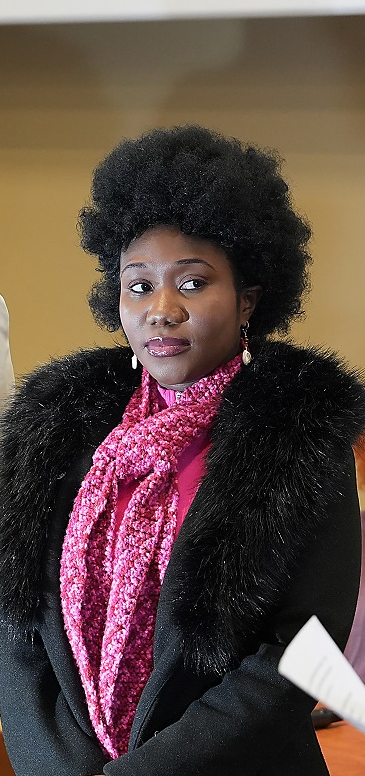
These experiences, however, motivated Oluyemi to pursue an active role in creating diverse communities, especially in Nigeria. “I really wanted to make a change,” said Oluyemi. “I want people to embrace unity and see ourselves together. If you're crippling growth because of where people come from, you'll be losing out on the development, economic advancement and technology that you could experience.”
Oluyemi is heavily involved on Purdue’s campus and the greater Lafayette area. She leads in the Nigerian Students Association, advocates with the Greater Lafayette Women Task Force, helps organize STEM seminars, mentors within the Disability Resource Center (DRC), and advocates for female reproductive health through the Purdue University Student Health (PUSH) Student Advisory Board.
In the work Oluyemi does, she says that she has “laid emphasis on diversity, even if something is against my personal belief system or my personal perspective. I believe that humans are important first. That's the most important thing, regardless of what I believe.”
Oluyemi plans to continue being a community leader at Purdue and beyond. For those interested in promoting diversity in their own communities, Oluyemi advised, “Be what you believe in. Don't just preach diversity, live it and lead by example.”
Rachel Zhang
Rachel Zhang, a master's student in agricultural economics and a doctoral student in hospitality and tourism management, believes diversity “means being empathetic, being mindful of the differences between groups in our community and, most importantly, taking actions to support people from marginalized and underrepresented groups.”
Zhang had limited experience with diversity growing up in China, a country where one ethnicity is predominant. “Where I grew up, we didn't talk about diversity frequently,” said Zhang. “My interest in supporting diversity started when I came to the States.”
“I'm a first-generation college student and English is not my first language,” Zhang said. “I began to realize that there are some differences between me and peers, and I received a lot of support from programs that help people like me. I started to think maybe I can be a supporter and an advocate for others in similar situations.”
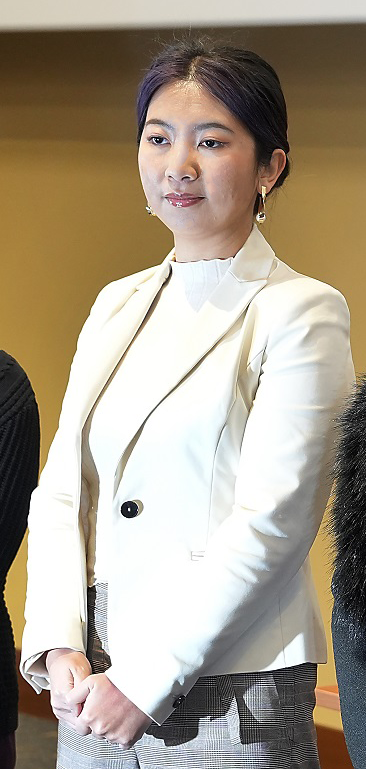
Zhang has become a supporter of diversity in many Purdue groups, especially as the diversity officer for the Purdue Graduate Student Government (PGSG). In this role, Zhang has worked to get four pieces of legislation passed in the Purdue Graduate Student Senate (PGSS), including recognizing Juneteenth on Purdue’s academic calendar, supporting inclusive gender options on affiliated websites, and providing academic writing support for international students.
Zhang’s work for PGSG also includes event planning. For example, Zhang spoke to representatives from Purdue’s cultural centers and shared educational resources to honor Hispanic and Native American Heritage Months. She also led the establishment of a PGSG committee focused on diversity-centered events and programs.
Zhang further serves the Purdue and Greater Lafayette community through promoting empathy and understanding. During the COVID-19 pandemic, she spoke to local authorities about concerns for Asians and Asian Americans to ensure their needs were recognized and addressed. Zhang also works with the Center for Advocacy, Resource and Education (CARE) to bring resources and support to victims of interpersonal violence.
“Embracing diversity goes beyond one’s own identity,” Zhang explained. “Communities are often willing to open doors for learning and share their diverse experiences. I advocate for approaching these opportunities with an open mind and a readiness to engage actively. Involvement shouldn't be limited by whether you directly identify with a particular aspect of the community; rather, it's about being willing to understand and support an array of different backgrounds and perspectives.”






